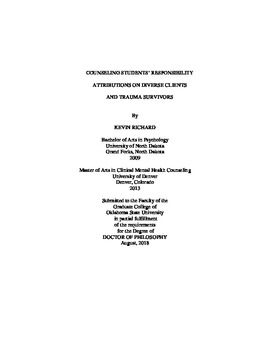| dc.description.abstract | How counseling students attribute responsibility to their clients' presenting concerns, and determine the solution to those concerns, influences the therapeutic relationship, client retention, and overall counseling efficacy (Greenleaf, Williams, & Duys, 2015). Despite the negative effects of attribution errors in counseling, little research has focused on how counseling students attribute responsibility to their clients' problems or solutions, especially within the context of diverse clients or trauma survivors. This study attempted to fill gaps in the literature by assessing counseling students' attributions of problem cause and solution for diverse clients and trauma survivors. The model of helping and coping developed by Brickman et al. (1982) was used to measure responsibility attributions for problem cause and solution by utilizing hypothetical client vignettes that varied in racial/ethnic background, or with the addition of a trauma history. A total of 217 counseling students from counseling programs around the United States participated in the study, with a total of 28 states being represented in the sample. Two separate two-way factorial ANOVA's (CRF-32) were conducted to determine effects of client race/ethnicity (Black/African American, Latino, or White) and the addition of a trauma history (yes or no) on counseling students' responsibility attributions of problem cause and problem solution. The interaction between these two variables was not significant for problem cause (F(2,211) = 1.208, p = .301) or problem solution (F(2,211) = .051, p = .95). The main effect of race/ethnicity was not significant for problem cause (F(2,211) = 1.803, p = .167) or solution (F(2,211) = 1.252, p = .288). The main effect of trauma history (yes or no) was significant for problem cause (F(1,211) = 58.251, p < .001) but was not significant for problem solution (F(1,211) = .048, p = .827). These findings suggest that the addition of a trauma history influences counseling students' views on their clients' presenting concerns by increasing their consideration for external factors while mitigating personal blame on the client. Implications and limitations to the study are discussed. | |
